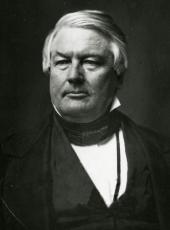WASHINGTON, Oct. 28. 1850.
My Dear Sir
I have yours of the 24th. from Franklin, N.H. and am greatly gratified to hear of your improved health; and hope soon to learn that your cough has entirely left you. I infer that you have not received my letters of the 23d inst. addressed to you at Boston. We have had two Cabinet meetings, the last this morning, on the authority and duty of the president to use the Military force in aid of the civil officer to execute the fugitive slave law, and have concluded when, necessary, to do it. We were somewhat embarrassed by the legislation of Congress on the subject, in 1807, and subsequent acts, which would seem to imply that this was a power to be conferred by Congress, but after a careful examination of the subject, I came to the conclusion that it was an inherent Executive power enforced by the constitution, when it made the President commander in chief of the Army and Navy, and required him to take care that the laws be faithfully executed. In this, however, the whole cabinet were not agreed, some think that the Marshall might summon the Army as citizens and part of the Comitatus, but all agree that the aid should be given, and the only question was when? We concluded to give it to the Marshall whereas, he was unable to sustain the laws by the civil authority, and to the special deputies in the same cases when a judge of the District or Justice of the Sup. Court, should certify that in his opinion it was necessary. This direction is given to the commanding officer of the Marines at Philadelphia.
Congress having authorized the Marshall to provide temporary jails, where the Sheriff refuses to admit the U. S. prisoners, we did not think it advisable to grant the use of the Receiving ship at Boston for that purpose. But I mean at all hazards to do my part towards executing this law. I admit no right of nullification North or South. My object however, has been to avoid the use of military force as far as possible, not doubting that there is yet patriotism enough left in every State North of Mason's and Dixon's line to maintain the Supremacy of the laws; and being particularly anxious that no state should be disgraced, by being compelled to resort to the army to support the laws of the Union, if it could be avoided. I have therefore commenced mildly—authorizing this force only in the last resort, but if necessary, I shall not hesitate to give greater power, and finally to bring the whole force of the government to sustain the law. But the mail is closing and I can not say more.
I have also yours of the 25th inst. and am gratified to hear that you are preparing an answer to the Dist. Atty, of Missi. and to the Austrian minister.
I can sympathise with you in the melancholy feelings which are inspired by looking upon the grave of your ancestors and kindred but I hope soon to welcome you back to the busy scenes of active life where your absence is so much deplored and your counsels so much wanted.
I am truly your friend
MILLARD FILLMORE
(Have not time to read over.)
SOURCE: The Letters of Daniel Webster. Edited by C.H. Van Tyne. McClure, Phillips & Co. New York. 1902.
Millard Fillmore, Letter to Secretary of State Daniel Webster Online by Gerhard Peters and John T. Woolley, The American Presidency Project https://www.presidency.ucsb.edu/node/378122

